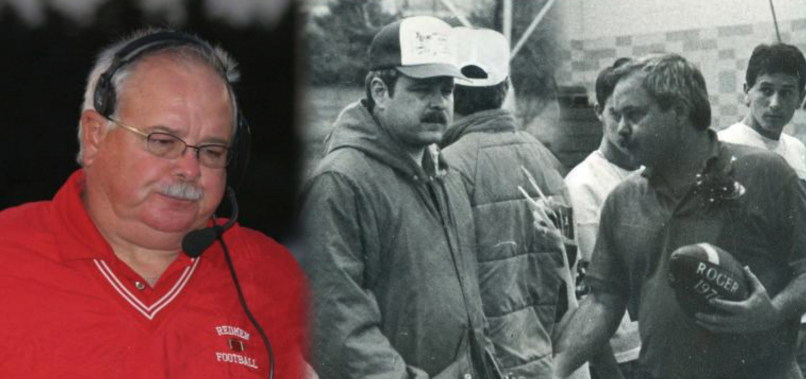More than a Coach!
In honor of National Coach's Day publisher John Baetz reflects on the impact of playing for the late Roger Barta

In mid-June, legendary former Smith Center football coach Roger Barta passed away.
For the better part of the last 40 years, I’ve been playing, coaching, or covering organized football — but playing for Coach Barta from 1989 to 1992 was by far the most important period in that four-decade stretch.
When I got the message that Coach Barta had passed, I just kind of paused. I didn’t break down — and for those who knew me as a young man, that’s probably a surprise. I’ve always been pretty emotional. At the end of the 1999 movie “Varsity Blues,” when Johnny Moxon says, “Billy Bob cried, because he’s a bit of a crier,” — well, I could relate. I did a bit of that myself, especially when the finality of my high school football career hit me after our last game. So for me not to break down when I heard about Coach Barta’s death? That was a bit of a surprise.
I think the biggest reason was that — even knowing he’d faced health challenges and the end was likely near — my first thought was an emphatic and joyful one: “That was a life well-lived!”
I haven’t lived in Smith Center in more than 25 years, but Coach Barta has remained a central figure in my life. He was a pillar of the place I came from, someone who quietly shaped so many of us during such an important stretch of our lives. He wasn’t just a football coach — he was steady, consistent, humble, and deeply invested in the young men he coached.
What’s stayed with me most since his passing is the overwhelming response from so many people — messages, texts, comments, posts. From Smith Center and far beyond. It’s a reminder that his reach extended well outside our little corner of north-central Kansas. He didn’t just build a program. He built people. And I’m incredibly grateful to be one of them.
One of the things that made Coach Barta truly unique was how effective he was at delivering his message. He rarely raised his voice — and when he did, it was always deliberate, kind of like when your mom said, “I’m not mad, just disappointed.” You knew it mattered.
He believed in values like humility, service, and discipline — and those weren’t just things he said, they were things he lived. It wasn’t about yelling or intimidation. It was about consistency.
At his Celebration of Life in late June, hearing his son Brooks — a coaching legend in his own right — speak about him brought so many memories rushing back. Brooks talked about one of his dad’s mantras: “Chalk it. Talk it. Repeat, repeat, repeat.” That methodical rhythm was Coach Barta’s way — simple, clear, and unwavering. That kind of consistency isn’t just good coaching. It’s a foundation for life.
I’ve thought about that a lot over the years. Even back in my playing days — before the streak, before the National Coach of the Year honors, before the New York Times bestselling book — I understood just how special it was to play for Coach Barta. My brother had played for him in the early ’80s and won a state title, so I grew up knowing the kind of impact he had. I knew from a young age that I wanted to be part of his program.
But with time — and life experience — that understanding only deepened. As we’ve grown into fathers, husbands, and community leaders, it’s become even more clear that Coach Barta wasn’t just preparing us for Friday nights. He was laying the foundation for who we’d become long after the final whistle blew.
Coach Barta had a way of saying things that stuck with you. They were simple, sometimes even a little funny, but over time you realized just how much wisdom they carried. One of the lines he said all the time — and one that I’ve repeated often in my own life — was:
“You can’t run with donkeys and expect to be a racehorse.”
Even as teenagers, I think we understood what he was trying to tell us — even if we didn’t always live it. It was a challenge to be intentional: about our friends, our influences, our direction. We knew even then that the people around us helped shape who we’d become. And Coach Barta wanted us to surround ourselves with people who made us better.
It wasn’t just motivational fluff. It was about being accountable to the standards you set and the people you surround yourself with. Whether it was in school, on the field, or long after football ended, Coach Barta wanted you to carry yourself in a way that reflected effort, respect, and pride.
He also wasn’t afraid to talk to a group of teenage boys about the importance of caring deeply for one another — of loving each other.
There are dozens of phrases I could quote — short, direct, and delivered in that calm voice of his — but one specific story stands out.
When I was a freshman, my class was preparing for a rare freshman game. Back in those days, Smith Center still had the numbers to play a full junior varsity schedule along with the occasional freshman matchup against a larger program like Concordia or Hays High.
Heading into that season, I didn’t have the confidence that was typical of Smith Center players under Coach Barta. My class had won just two games as eighth graders, and the expectations weren’t exactly sky-high. I don’t know that we ever talked about it openly, but I think a lot of us were nervous — unsure if we could measure up to the classes that came before us.
One afternoon during practice, I was standing on the sideline taking a breather while some of my classmates worked on executing an offensive play. Coach Barta sauntered up next to me, watched a couple of snaps, then turned and said,
“You know, buddy, I don’t think you guys are gonna be that bad,” and slowly walked away toward the locker room.
That was it. But for a young player who craved inclusion in the Smith Center tradition of excellence, that simple sentence gave me the confidence to compete — not just that week, but for the rest of my career.
But Coach Barta also had a wonderful sense of humor.
In my junior year, I suffered a shoulder separation just before the start of the season, which caused me to miss the first three games of 1991. I was heartbroken. I begged Coach Barta to let me play junior varsity ahead of my return to varsity action, but he wouldn’t allow it. I had earned the right to play varsity football, and he wasn’t going to risk me re-injuring myself in a JV game.
Still, I suited up in Week 2, just in case I was needed in a pinch.
Late in that game, Coach Barta shouted down the sideline — “Baetz! Baetz! Baetz!” — and even enlisted some of my teammates to rush over and tell me how urgently he needed me. For a moment, I truly believed I was going into the game.
I sprinted over, ready for the call. Coach Barta turned, looked me in the eye, and said:
“Can you get me a drink of water?”
He and the assistants — and many of my teammates — got a good laugh at my frustration at not going into the game. At the time, I was furious. I was itching to get into a game we were already winning comfortably. But looking back now, I realize how special it was that he included me in a little harmless fun. He had a way of reminding you not to take yourself too seriously — and of making you feel like you were still part of something bigger than a football game.
Looking back, it wasn’t moments on the scoreboard that defined his impact. It was those small interactions — full of honesty, humor, and care — that said everything about who he was.
Coach Barta wasn’t flashy. He wasn’t loud. But he was profound — in the way he coached, and in the way he made you feel seen and valued. He left behind wins and trophies, sure, but far more importantly, he left behind a legacy of character, humility, and quiet strength.
The older I get, the more I realize just how rare that kind of leadership is. I’m proud to say I played for Roger Barta. And I’ll carry his lessons — and his voice — with me for the rest of my life.

